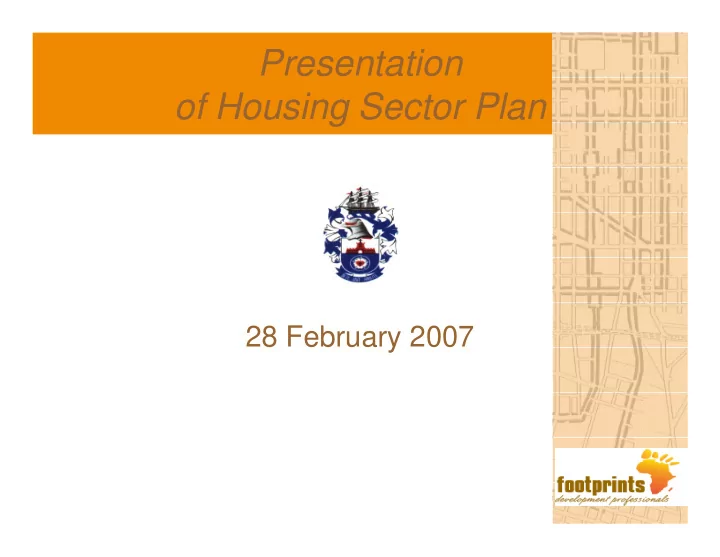

Presentation of Housing Sector Plan 28 February 2007
Purpose of HSP Provide a housing focus to Municipal IDPs Formulate method of sequencing projects Ensure allocation of limited resources Ensure effective subsidy budgeting and cash flow Obtain political consensus HSE is not a one off end product, it involves an ongoing participative process that is both proactive and reactive
Elements of HSP CONTEXT HOUSING SITUATION DELIVERY PROGRAMMES Planning Context Housing Sector Plan Delivery Targets Spatial Context ID current projects Annual Targets Socio-Economic Indicators ID planned projects Mgmt Capacity Housing Backlog Budget implications Monitor/Evaluate Housing Demand Integration Land Legal Situation
Project Context Socio-Economic (2002 Census) Total population 108 037 Second largest population in the district Youthful population, 29% (18-25) High illiteracy level at 69.5% 33% of (27 303) HH, have no income 66% of HH earn between R0-R800 Likelihood of new H.H formations Indication of high state dependency correlating with 43.7% unemployment.
Housing Demand Assessment Housing need is determined through: Census Statistics Analysis of Housing Lists Hybrid of census data and proposed housing projects Backlog set at 5920 hh, 72% of the poorest hh Shortcomings Unable to link subsidy to beneficiary Beneficiaries cannot be classified by income & gender Need spatially located in tribal area 0-19% of people live in formal housing Highest number of hh with less than 2 rooms Classified as areas of greatest need
Meeting the Backlog Project Ward Settlement Subsidies Project Approved Prep Name Type Required Packaging Prep Fund Application Crammond 1 Urban 500 500 Dalton 7 Urban 400 400 Trust Feed 8 Peri-Urban 1000 1000 New 2 Urban 500 500 Hanover Mpolweni 8 Peri-Urban 500 500 Ngubane 3 Traditional 500 500 Gcumisa 11 Traditional 500 500 Mthuli 5 Traditional 500 500 Ntazi 4 Traditional 500 500 Zondi 3 Traditional 500 500 Ndlovu 3 Traditional 500 500 Windy Hill 7 Informal/Slu 50 50 m Total 5950 3000 2950
Meeting the Backlog Phase 1 Project packaged &budgeted for by DOH Land acquisition first quarter of 2007 Phase 1: Project- linked Subsidy Income Project No of 2006/7 2007/8 Category Name Units Subsidy Subsidy R0-R3 500 Dalton/Cool Air 400 R36 528.00 R46 312.00 Total R14 611200.00 R18 524 800.00
Meeting the Backlog Phase 2 Focuses on rural housing Project currently being packaged Access to tribal land Utilisation of institutional subsidy Municipal capacity to manage construction of 3000 units
Meeting the Backlog Phase 2 Phase 2: Institutional Subsidy Income Project No of 2006/2007 2007/2008 subsidy category Name Units subsidy R0-R3 500 Ngubane 500 R34 049.00 R39 156.00 Gcumisa 500 R34 049.00 R39 156.00 Mthuli 500 R34 049.00 R39 156.00 Ndlovu 500 R34 049.00 R39 156.00 Ntazi 500 R34 049.00 R39 156.00 Zondi 500 R34 049.00 R39 156.00 Total 3000 R102 147 000 R117 468 000
Meeting the Backlog Phase 3 Constitutes of projects in former TLCs Packaging projected in year 2007/8 Land identified is privately owned Land has been valued and in other instances sale agreements signed with municipality Liaison with DLA to acquire land
Meeting the Backlog Phase 3 Phase 3: Project Linked Subsidy Income Project No. 2006/2007 2007/2008 2008/2009 category Name Units subsidy subsidy subsidy R0-R3500 Crammond 500 R36 528.00 R41 130.00 R46 312.00 New 500 R36 528.00 R41 130.00 R46 312.00 Hanover Mpolweni 500 R36 528.00 R41 130.00 R46 312.00 Windy Hill 50 R36 528.00 R41 130.00 R46 312.00 Total 1950 R56 618 400 R63 751 500 R71 783 600
Meeting the Backlog Phase 4 Trustfeed Complex land legal issues more than 40 land owners Friendly expropriation proposed
Meeting the Backlog Phase 4 Phase 4: Project Linked Subsidy Income Project No. 2006/2007 2007/2008 2008/2009 2009/2010 category Name Units subsidy subsidy subsidy subsidy R0- Trustfeed 1000 R365280000 R41130000 R4631200 R52147 000 R3500 Total 1000 R36528000 R41130 000 R4631200 R52147 000
Land Demand for Projects Private Ownership New Hanover Crammond Dalton/Cool Air Mpolweni Trustfeed Windy Hill State Land Ngubane/Efaye
Land Demand for Projects Tribal Land Ngubane Gcumisa Mthuli Ndlovu Ntanzi Zondi
Integration of Identified Land Land Reform: tenure reform & redistribution Spatial Integration Access to employment Opportunities Access to social services Access to transport Bulk services Cemeteries
Institutional Management Structure uMshwathi Council Municipal Manager Housing Manager Support & Administration Research Planning Projects Engineering & Policy
Conclusions The Municipality must consider economic development strategies that will create a vibrant local economy to reduce the high levels of state dependency. The strategic location of the municipality offers opportunities for the development of middle income housing
Conclusions Housing development should consider priroitizing areas of greatest need There is a need for a more structured involvement of the key stakeholders that is the Department of Housing, the Municipality and the Department of Land Affairs. Housing budget over a 5 year R259 923 400.00
Recommend
More recommend